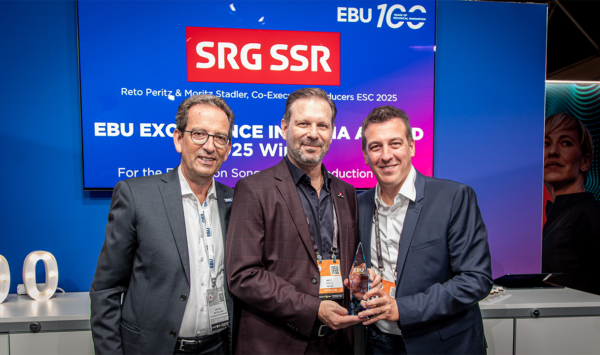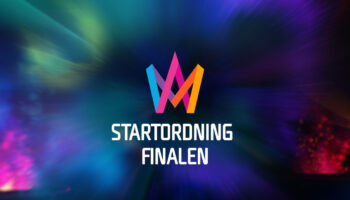The Swiss national broadcaster, SRG-SSR, has been honoured with the EBU Excellence of Media Award for the Eurovision Song Contest 2025.
SRG-SRG excelled in the best of ways last May when it produced and hosted the ESC 2025. The Eurovision Song Contest 2025 was held in Basel, Switzerland. Hence the Swiss national broadcaster was honoured with the prestigious award last week at the IBC in Amsterdam.
The ESC 2025 Executive Co- Producers Reto Peritz and Moritz Stadler received the award on behalf of SRG-SSR.
Reto Peritz (ESC 2026 Executive Co Producer/ SRG-SSR) says:
Receiving the EBU Media Excellence Award at IBC in Amsterdam is a true honor for SRG as Host Broadcaster of the Eurovision Song Contest 2025 in Basel. This recognition is a tribute to the creativity and dedication of all teams involved and marks the conclusion of a once-in-a-lifetime journey for which we are deeply thankful.
Moritz Stadler (ESC 2026 Executive Co- Producer/SRG-SSR) says:
The Eurovision Song Contest is the ultimate celebration of creativity, uniqueness and live entertainment. The ESC in Basel was truly an event for everyone – inspiring, rewarding and uniting millions of people across Europe and beyond. This award underlines that the Eurovision is more than just a TV show – it is an experience that brings people together.
The EBU’s official press release reads:
The European Broadcasting Union (EBU) has awarded Swiss public service media organization SRG SSR the Excellence in Media Award in recognition of its outstanding production of the Eurovision Song Contest (ESC) 2025, hosted in Basel and broadcast to audiences worldwide.
The award was presented at the IBC in Amsterdam, celebrating SRG SSR’s role as host broadcaster of one of the world’s largest live entertainment events. The ESC 2025 captivated millions of viewers across Europe and beyond with its exceptional blend of creativity, innovation, and live performance.
The EBU’s press release continues to read:
The scale of the production in Basel reflected the extraordinary ambition behind the 2025 ESC event. It involved 22 broadcast cameras, including aerial systems and stabilized gimbals, supported by two of the largest UHD outside broadcast trucks in Europe, plus four sound control rooms. The stage and arena set-up required 3.5 km of truss and 4,500 lighting fixtures, including 2000 intelligent lights and several world-first fixtures. It used 750m² of vertical video LED walls, 200 m² of LED stage floor, and 16 high-powered projectors. Behind the scenes, nearly 250 technical and creative staff worked around the clock over a 45-day on-site build and dismantle period. The Grand Final in Basel was seen by 166 million viewers across 37 public‐service media markets.
Antonio Arcidiacono (EBU Director of Technology & Innovation) says:
Large-scale live events like the Eurovision Song Contest are a truly unique contribution to understanding and connecting across borders. They are not only about entertainment but also about creating shared experiences that transcend language barriers. The critical role of technology and creativity working hand in hand is what makes such moments possible, and the 2025 edition in Basel was a shining example of this power.




